When Balint Pasztor left Hungary to co-found DiffuseDrive in Silicon Valley, he wasn’t chasing a buzzword. He was chasing a bottleneck. Artificial intelligence was accelerating, but its progress was constrained by something less glamorous than algorithms: data. Training machines requires endless examples of real-world complexity — the stray pedestrian crossing at the wrong time, the drone encountering unusual weather, the industrial robot misreading its environment. Traditional simulations couldn’t keep up. They were too generic, too clean, too slow.
Pasztor and his co-founder, Roland, saw an opening. By harnessing diffusion models — the same generative technology behind today’s AI art and text tools — they could produce customized, high-fidelity synthetic data at scale. More importantly, they could generate diversity. Instead of a handful of edge cases crafted over days, DiffuseDrive could produce tens of thousands in hours, each realistic enough to close the critical “simulation-to-reality gap.” That leap made their approach immediately valuable to industries where safety, accuracy, and reliability are non-negotiable.
The company’s impact has been concrete. Fortune 500 partners have measured performance gains of 30 to 40% on datasets they had spent a decade building. In one case, a client received 15,000 edge cases in hours, data that would have taken three to four years to capture in the wild. The results aren’t just incremental improvements; they’re step-changes, enabling companies to tackle problems they once thought were out of reach. For engineers, it’s more than numbers, it’s relief, satisfaction, and the thrill of finally being equipped with the tools they’ve always wanted.
Building DiffuseDrive hasn’t just been a technical journey, it’s also a human one. Pasztor is quick to highlight the energy that comes from being embedded in Silicon Valley’s culture of grit and ambition. London, where he once lived, offered brilliance, but not the density of builders. San Francisco, for all its chaos, forces founders to raise their game. That intensity informs his own philosophy: stay grateful, focus on what could go right, and surround yourself with people who elevate your vision. In Roland, he’s found the perfect complement — Pasztor the visionary, Roland the integrator — forming a partnership that balances big ideas with disciplined execution.
What lies ahead for DiffuseDrive is both broad and urgent. Beyond autonomous vehicles and civil robotics, the company is pushing into defense, a space where synthetic data isn’t just about efficiency but about national security and resilience. At the same time, the team is racing to evolve into a fully self-serve platform, accelerating adoption across industries. With a recent seed round secured and major contractors already onboard, Pasztor sums up the company’s trajectory simply: build, build, build.
For all its ambition, DiffuseDrive is solving a deeply practical problem: making data as complex, diverse, and unpredictable as the world itself. In doing so, Pasztor and his team aren’t just fueling AI development, they’re shaping the foundation of a machine-learning era that can finally keep pace with reality.
Want more Plugged In? Read more or listen on Apple Podcasts.









